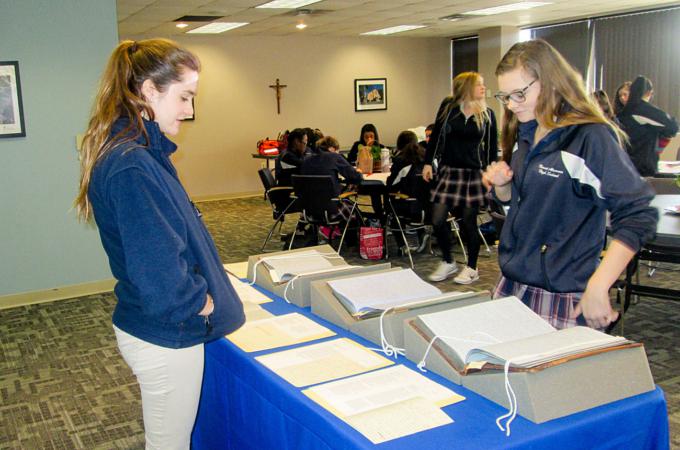Mount Alvernia students learn from archives' historic letters
This past Tuesday, 33 sophomores from Mount Alvernia High School, Newton, visited the Pastoral Center.
Archive staff and interns took them on a tour of the library and archive, introducing them to the fundamentals of archive work: where the collections come from, the basics of preservation, day to day responsibilities, and our interactions with researchers.
Following the tour, the students worked on a history activity where they were asked to read and draw conclusions from a collection of eight letters belonging to Father Hilary Tucker, much like they would if they were a researcher working in the library.
Father Tucker was born in Perryville, Missouri in 1807. He studied for the priesthood in Rome, was ordained in 1837, and then returned to the United States, settling in Illinois. Nine years later, he arrived in Boston seeking support for his mission, at which time he asked Bishop John Bernard Fitzpatrick for permission to stay. Father Tucker would go on to serve at the parishes of St. Patrick in Lowell and the Cathedral of the Holy Cross, and would remain in Boston until his death in 1872.
The letters selected for the activity dated from 1861 to 1865, during the American Civil War. Much of Father Tucker's family was still residing in Missouri at the time, which was one of the "border states" whose allegiances were split between the North and South.
Several of the letters are from Father Tucker's brother, Louis, who was also a priest. He speaks of a recent battle near Fredericktown, Miss., and rumors that the Confederates remained nearby and were preparing for another thrust into the area. He also reveals how the war has affected his work, most notably his arrest for preaching without first taking an oath of loyalty to the government, and his upcoming trial. In addition, he talks about his dwindling congregation as people fled the local area, and his determination to stay and defend his church "to the last" should the Confederates attack.
Working in groups, the students were able to identify the effect the war had upon the authors, offering them a view into how the war affected common people. Other letters discuss the loss of a family provider, a stunted local economy, torn loyalties, and the imminent threat of invasion.
In addition to the tour and history activity, students also had the opportunity to visit the offices of The Pilot and meet editor Antonio Enrique. The day concluded with noon Mass at the Bethany Chapel, and a few minutes of reflection, as a group, upon the day's activities.
It is important to recognize that our collections, as with many similar institutions, are open for use to the public, regardless of qualifications. We were very happy to open our doors to this group of young scholars and be able to offer them the experience of working with historic documents.
THOMAS LESTER IS THE ARCHIVIST OF THE ARCHDIOCESE OF BOSTON.



















